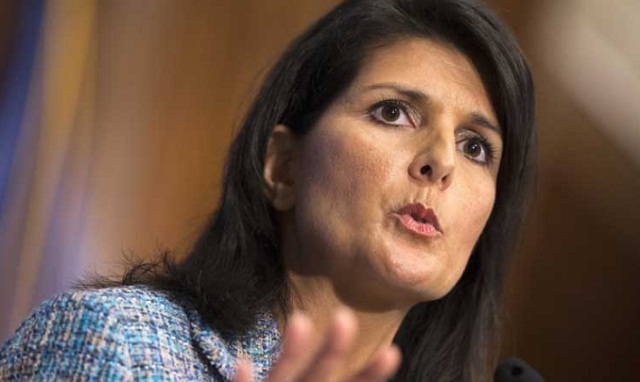
United Nations, United States | AFP | US Ambassador Nikki Haley told countries at the United Nations on Wednesday they need to “step up” and pay a bigger share of the multi-billion-dollar bill for peacekeeping operations.
The largest financial contributor to UN peacekeeping, the United States last year negotiated a $600 million cut to that budget, but Haley made clear the administration wants to further trim the bill.
The United States will remain the number one financial supporter, Haley told a Security Council debate on peacekeeping, but it will cap its contribution to 25 percent, down from the current level of 28.5 percent.
“One country should not shoulder more than one quarter of the UN peacekeeping budget, and we look forward to a more equitable distribution of the budget among member states,” she said.
“Moving forward, the United States will not pay more than 25 percent of the peacekeeping budget.”
“All of us have a role to play, and all of us must step up.”
After complex negotiations among the UN’s 193 countries, the peacekeeping budget for 2017-2018 was set at $6.8 billion with 10 countries paying the lion’s share.
After the United States, China is the second biggest contributor, covering 10.25 percent of the budget followed by Japan, Germany, France, Britain, Russia, Italy, Canada and Spain.
Negotiations on changing the UN scale of assessments for these payments are expected to be tough-going.
The cap of 25 percent of the US contribution has been in US law since the 1990s, but Congress has in the past waived that requirement at the administration’s request.
President Donald Trump’s administration has taken a hard line on UN funding, cutting contributions and pushing for cost-saving reforms.
– Unrealistic expectations –
The push for US funding cuts came as UN Secretary-General Antonio Guterres launched a bid to modernize peace missions following a sharp increase in attacks that killed 59 blue helmets last year.
The UN’s largest missions in the Democratic Republic of Congo, Mali, the Central African Republic and South Sudan are struggling to protect civilians caught in fighting that shows little sign of abating.
“Peace operations cannot succeed if they are deployed instead of a political solution, rather than in support of one,” Guterres told the council.
“We are damaging the instrument of peacekeeping, and indeed multilateralism itself, in creating unrealistic expectations. Lives and credibility are being lost,” he said.
The United Nations has also been shaken by a wave of sexual abuse allegations against its peacekeepers in many of its 15 missions, which Guterres has vowed to root out.
A strong global player in peacekeeping, China said it will actively take part in an overhaul of the peace missions and backed efforts by the African Union to carve out a bigger role.
“China supports the peacekeeping funding proposal from the AU and hopes to see details of the AU-owned peacekeeping operations,” said Chinese Ambassador Ma Zhaoxu.
France also said it would back a future request from the African Union for funding of its peace operations.
More than 100,000 troops from 120 countries serve under the UN flag in missions worldwide.
RT @USUN: Peacekeeping is a shared responsibility. With shared responsibility comes shared burdens and shared costs. One country should not shoulder more than one quarter of the UN peacekeeping budget. pic.twitter.com/dSHZMDqkbG
— Nikki Haley (@nikkihaley) March 28, 2018
 The Independent Uganda: You get the Truth we Pay the Price
The Independent Uganda: You get the Truth we Pay the Price



